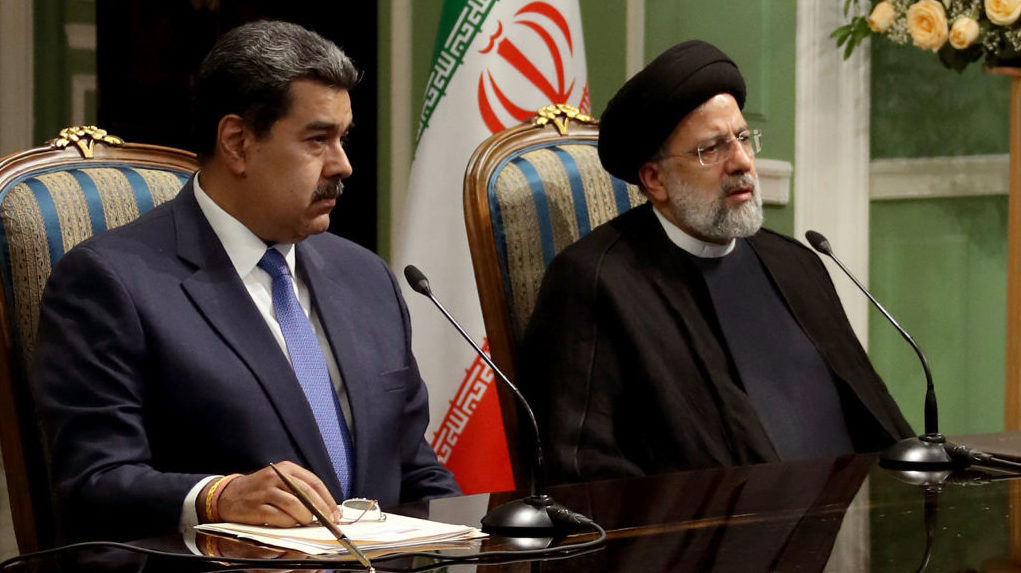20-Year Cooperation Agreement Between Iran, Venezuela Is ‘Largely Symbolic,’ Experts Say
Neither country is the solution to the other’s problems, which have been exacerbated by international sanctions
Iranian President Ebrahim Raisi and his Venezuelan counterpart Nicolás Maduro have signed a 20-year cooperation agreement between their countries.
The announcement came on Saturday during Maduro’s visit to Teheran as part of a world tour Venezuela’s president is conducting, during which he also visited Turkey and Algeria.
Iran and Venezuela are two of the world’s top oil producers, and they are both among the most heavily sanctioned by the United States.
The presidents said in their statement that the agreement includes cooperation in the financial, energy and defense fields.
“We have important projects of cooperation between Iran and Venezuela in the fields of energy, petrochemical, oil, gas and refineries,” Maduro said during the announcement.
Raisi remarked how Iran prizes Venezuela for “resisting” US sanctions. “The Islamic Republic of Iran’s foreign policy has always been to have relations with independent countries, and Venezuela showed that it has had incredible resistance against threats and sanctions by enemies and imperialism,” he said.
Cooperation with Venezuela cannot save Iran’s economy. A sanctioned country like Venezuela can do little to help Iran.
Ehsan Ejazi, a researcher at the Iranian Association for West Asian Studies, and head of Palestine and Israel studies at the same organization, told The Media Line that, with the agreement, “Iran hopes to circumvent unilateral US economic sanctions with the help of Venezuela, and also intends to work with the Latin American country to neutralize oil sanctions.”
However, Richard Bronze, head of Geopolitics at Energy Aspects, a research firm covering global energy markets, believes that since the last year has seen increasing ties between the Iranian and Venezuelan oil sector, the new agreements will be “largely symbolic.”
He described the two countries as “seeking to cement the existing cooperation and heavy on rhetoric about overcoming US sanctions.”
Ejazi says that the agreement will not bring a real solution to Iran’s financial difficulties.
Iran’s economic problems have internal causes, he said, “and sanctions have only exacerbated them. As a result, cooperation with Venezuela cannot save Iran’s economy. A sanctioned country like Venezuela can do little to help Iran.”
Iran signing that agreement is, rather, a message to the US, according to Ejazi.
“Iran signs an agreement to show Biden’s government that if the US does not accept Iran’s terms in nuclear talks, Iran will find ways to circumvent sanctions and will not give in to US demands,” he said.
Bronze believes that restoring the Iran nuclear deal has been out of reach for several months already, due to an impasse between the US and Iran, and that “the recent developments don’t alter that view.”
Matthew L. Wald, an energy consultant and writer who formerly worked as a policy analyst and communications adviser at the Nuclear Energy Institute trade association, and was a reporter at The New York Times, told The Media Line that Iran is, in fact, moving in the opposite direction, away from reaching a nuclear agreement. He added that he also does not see Venezuela as a viable solution for Iran’s difficulties.
“Iran is removing monitoring cameras put in by the International Atomic Energy Agency. I don’t think this deal is big enough to solve either country’s problems,” he said.
Though the details of the Iran-Venezuela agreement have not been disclosed, Ejazi says that, with the deal, Iran may intend to sell its oil through Venezuela to some European customers since the Biden administration has allowed some European companies to buy oil from Venezuela.
Wald believes that the agreement may be more about refinery products.
Venezuela has enormous oil reserves and is still producing more than it needs internally, but it can’t refine enough oil into gasoline to meet its needs, he explained.
Wald added that Venezuela has been exporting oil and swapping it for the refined product. “This is like a farmer swapping grain for bread,” he illustrated.
The agreement is not likely to have a real effect on the global oil market, according to Bronze.
Wald points out that global oil demand is around 100 million barrels per day. These transactions, he said, referring to the ones that the agreement between Venezuela and Iran could bring, “are probably going to be in the range of hundreds of thousands of barrels a day, or less.”
Iran, Venezuela and Russia are all political allies, but there is an inherent tension in them all trying to sell crude to the limited number of buyers willing to ignore US sanctions
Bronze noted that the sanctions on Russian oil exports due to the invasion of Ukraine has tightened the already reduced oil buyer’s market that is open to trade with Iran and Venezuela.
He added that the politics of the oil smuggling trade are evolving as Russian oil comes under increasingly tight Western sanctions.
“Iran, Venezuela and Russia are all political allies, but there is an inherent tension in them all trying to sell crude to the limited number of buyers willing to ignore US sanctions,” he said.
However, Bronze explains that all three countries have limited options when it comes to international allies and he does not believe that the fact that they are all competing in the smuggled oil market will prompt a public breakdown in relations.
“But it does mean there will be limits to how far each will be ready to go to help the others sell more oil,” he said.


